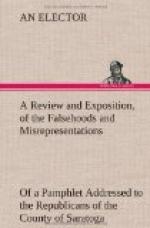She cannot be assailed with success at home, and she has no need to leave her own territories in search of lands to colonize. Her population, secure in its own vast numbers and vast resources has, for all future needs of expansion the continent of Siberia into which to overflow. Russia cannot be threatened within Russia and has no need to go outside Russia. A Russian army of 4,000,000 is not necessary to self-defence. Its inspiration can be due only to a policy of expansion at the cost of others, and its aim to extend and to maintain existing Russian frontiers. As I write it is engaged not in a war of defence but in a war of invasion, and is the instrument of a policy of avowed aggression.
Not the protection of the Slavs from Austria, herself so largely a Slavic power and one that does not need to learn the principles of good government from Russia, but the incorporation of the Slavs within the mightiest empire upon earth—this is the main reason why Russia maintains the mightiest army upon earth. Its threat to Germany, as the protector of Austria-Hungary, has been clear, and if we would find the reason for German militarism we shall find at least one half of it across the Russian frontier.
The huge machine of the French army, its first line troops almost equal to Germany’s, is not a thing of yesterday.
It was not German aggression founded it—although Germany felt it once at Jena. Founded by kings of France, French militarism has flourished under republic, empire, constitutional monarchy, and empire again until to-day we find its greatest bloom full blown under the mild breath of the third republic. What is the purpose of this perfect machine? Self-defence? From what attack? Germany has had it in her power, again and again within the last thirty years to attack France at a disadvantage, if not even with impunity. Why has she refrained—whose hand restrained her? Not Russia’s—not England’s. During the Russo-Japanese war or during the Boer war, France could have been assailed with ease and her army broken to pieces. But German militarism refrained from striking that blow. The object of the great army France maintains is not to be found in reasons of self-defence, but may be found, like that of Russia in hopes of armed expansion. Since the aim in both cases was the same, to wage a war of aggression to be termed of “recovery” in one case and “protection” in the other, it was not surprising that Czar and President should come together, and that the cause of the Slavs should become identified with the cause of Strasburg.
To “protect” the Slavs meant assailing Austria-Hungary (another way of attacking Germany), and to “recover” Strasburg meant a mes-alliance between democrat of France and Cossack of the Don.
We come now to the third party to die Entente, and it is now we begin to perceive how it was that a cordial understanding with England rendered a Russo-French attack upon Germany only a question of time and opportunity. Until England appeared upon the scene neither Russia nor France, nor both combined, could summon up courage to strike the blow. Willing to wound they were both afraid to strike. It needed a third courage, a keener purpose and a greater immunity.




